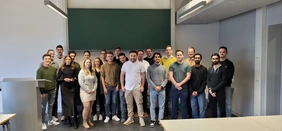Practical experience and innovation: A THI team of 19 Master's students led by Professor Gerd Schwandner, Professor Roland Meyer, and Matthias Beer (Director of Imaging Sensor Products at Rohde & Schwarz) worked on and completed the project modules "Market and Technology Analysis" and "Production Technology".
In the market and technology analysis, the LiDAR technology was first analyzed and evaluated: technology types, strengths/weaknesses, expected innovations, applications, and expected cost degression of the sensors. In addition, LiDAR manufacturers were analyzed, profiled, and divided into strategic groups. The focus of the analysis was on the application of LiDAR in assisted and autonomous driving. "Sensor roadmaps" of leading automotive OEMs in Europe, the USA, and China were created to concretize the market understanding. This confirmed the hypothesis that LiDAR enables a sensor system to determine distances to objects more accurately and thus visualize the surroundings with a higher spatial resolution. The additional sensor type can also compensate for the weaknesses of other sensors and at the same time create safety-relevant system redundancies. LiDAR therefore appears to be indispensable on the way to autonomy levels >3. Finally, a scenario analysis was used to develop a market forecast for LiDAR up to 2030, from which the market potential for a LiDAR test system can be derived.
The challenge when planning the manufacture of a new product type is to determine which key technologies need to be focussed on for reliable production when the properties are not yet fully known. This raises the question of the company's technological capabilities and the risks involved in mastering new technologies. In the present case of a new type of test facility for LiDAR sensors, the project group intensively examined the current technical product characteristics of the concept and analyzed components available on the market for comparison and classification.
The project module enabled the students to immerse themselves in a completely new topic and gain practical experience and knowledge. The use case analyzed by the Master's students is a sub-aspect of the global hyper-trend of assisted and autonomous driving. The project results enabled Rohde & Schwarz to sharpen its view of the market and technology and gain important insights into the requirements for multimodal ADAS sensor test systems.


![[Translate to English:] Logo Akkreditierungsrat: Systemakkreditiert](/fileadmin/_processed_/2/8/csm_AR-Siegel_Systemakkreditierung_bc4ea3377d.webp)








![[Translate to English:] Logo IHK Ausbildungsbetrieb 2023](/fileadmin/_processed_/6/0/csm_IHK_Ausbildungsbetrieb_digital_2023_6850f47537.webp)


